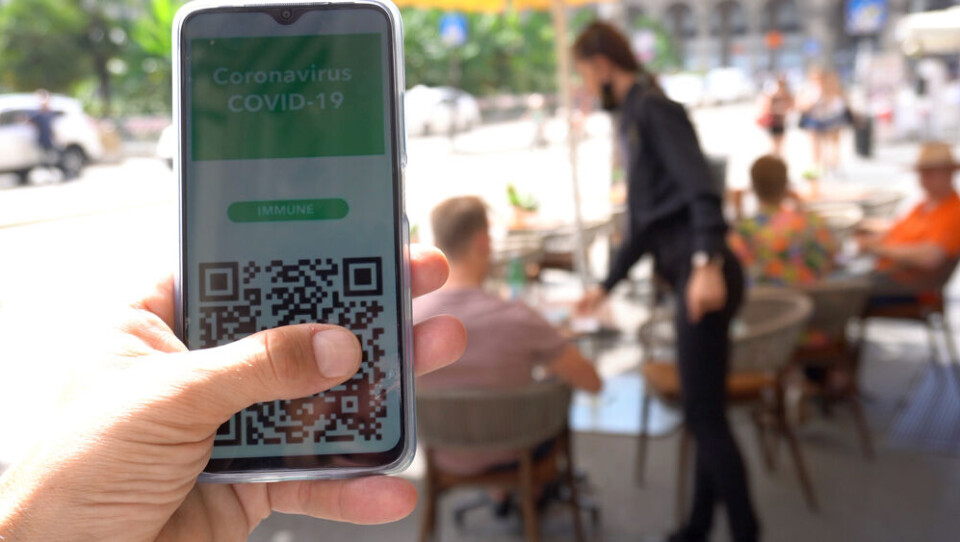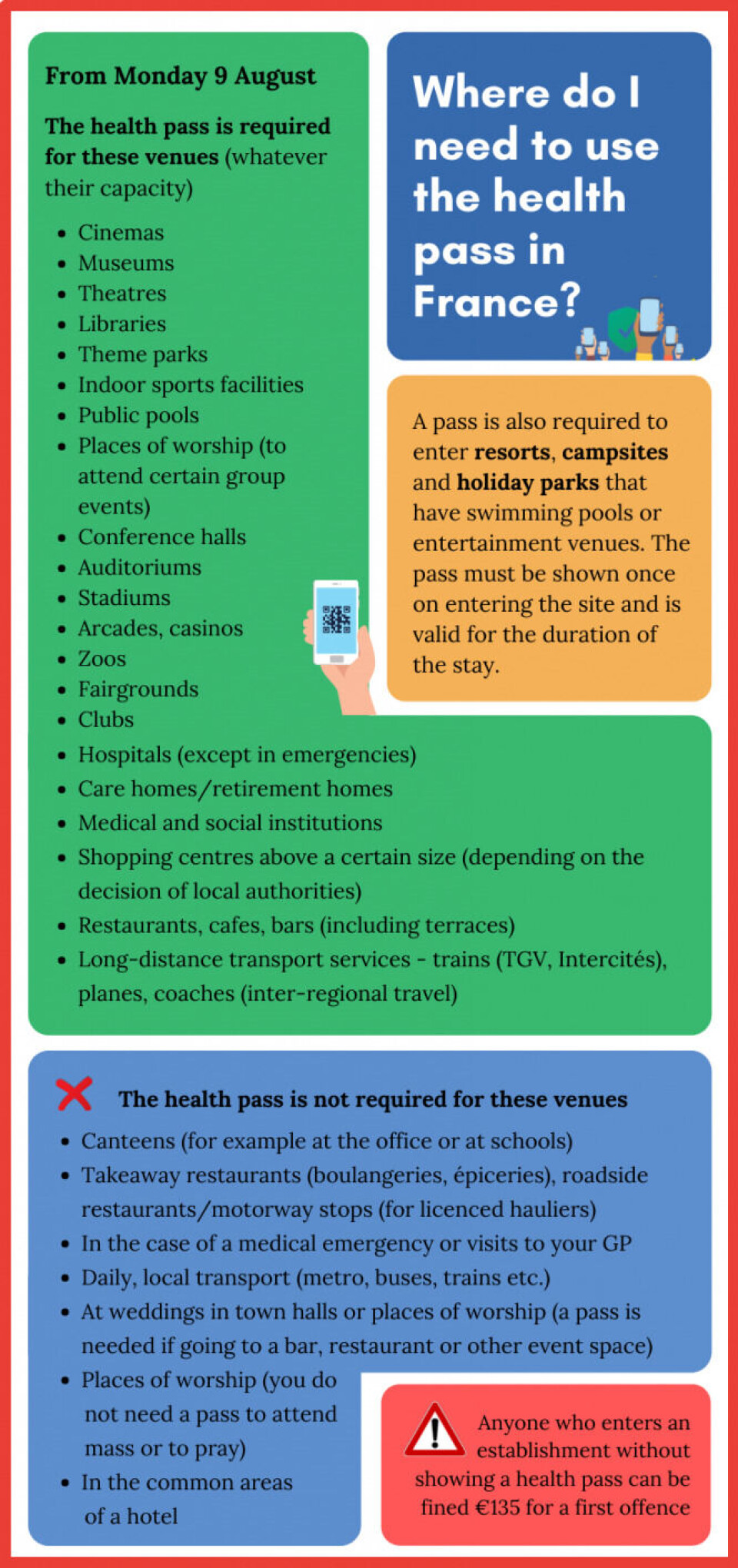-
Many parcel collection points in France are overwhelmed as Christmas approaches
Heavy customer traffic leaves some struggling to cope
-
Warnings issued over connecting to public WiFi networks in France
Lack of encryption and risk of connecting to ‘fake networks’ leave users at risk of hacking attempts
-
Provence’s santon makers seek geographical protection for historic craft
The small, hand-painted clay figurines are at the heart of traditional French Christmas nativity scenes
France extends health pass today: Rules for residents and tourists
A health pass is now required to go to restaurants, cafes and bars - including on terraces - and to use long-distance transport services and to enter hospitals in non-emergency situations. Here is how it works

Everyone aged 18 and over in France must from today (August 9) present a health pass (pass sanitaire) to enter public spaces including:
- Cafes, restaurants, and bars, including those inside shopping centres
- Health establishments, except in case of emergency (see below)
- Some shopping centres larger than 20,000m2 if mandated by local prefects
- Long-distance transport within France, such as long-distance trains (such as on TGVs Inoui and Ouigo) and on domestic flights. Air France has created a "Ready to Fly" checking service that passengers can use ahead of their flight, which includes the health pass.
- Culture and leisure spaces such as museums and cinemas, regardless of their capacity
- Communal spaces in hotels such as the restaurant, bar, swimming pool, or spa
- Events being held at religious centres, such as concerts or conferences
- Events such as weddings being held in public spaces
Read more: Shopping centres, hospitals: What are rules for French health pass?
Children aged 12 - 17 will have to also use the health pass from September 30.
It is part of a new French law requiring people to prove their Covid-19 status to enter certain public spaces.
What is the French health pass?
The health pass is not a document but a way to prove you do not have Covid-19.
It is not restricted to vaccination and demonstrating your health pass on entry to a venue effectively means you must show either:
- Proof of vaccination,
- Or proof of a negative Covid test taken within the past 48 hours (PCR or rapid antigen)
- Or proof of having been positive with Covid 11 days to six months before entering the space
These documents can be shown in paper format, digitally, or through the phone application TousAntiCovid.
Typically, there will be a QR code attached to the document that staff at the venue can scan to verify your proof.
Where do I need to show the health pass in France?
- Cinemas
- Museums
- Theatres
- Libraries
- Theme parks
- Indoor sports facilities and public pools
- Places of worship
- Conference halls
- Auditoriums
- Stadiums
- Arcades
- Casinos
- Zoos
- Fairgrounds
- Nightclubs
- Shopping centres (depending on decision of local authorities)
- Restaurants (including terraces), cafes, and bars
- Long-distance transport services (TGV and intercité trains, planes and regional coach travel)
- Hospitals (except in emergency situations), care homes, and medical and social institutions
You must also have a pass to enter campsites and holiday parks with swimming pools or entertainment venues.
A pass has been required since July 21 in all sites with capacity for at least 50 people, including museums, cinemas, theatres, sports halls, and zoos.
This 50-people threshold will no longer apply from August 9, and the health pass will be required for all such sites regardless of capacity.
Who will check it and how?
Staff working at the cafes, restaurants and bars should check your health pass. It will be checked using an app specially designed for the purpose: TousAntiCovid Vérif.
You must present your QR code on paper or in your app. The checking app will appear green if your pass is valid, and red if it is not.
In restaurants, this will likely be done before you are shown to your seat.
In cafes and bars, this will be more complicated, but waiters will most likely ask you to show the pass before they take your order.
The staff will not ask you for your ID. This is the job of the police - identity checks by police though will not take place within establishments, but outside.
In addition, if managers of establishments suspect anything untoward, they can phone the police to ask them to check a person’s health pass.
Read more: France’s health pass does not have a photo so must we show ID too?
What will happen if I refuse to show the pass sanitaire?
The establishment can refuse to serve you.
There is a fine of €135 for anyone caught using a fake certificate.
Fraud measures
The government is set to introduce tough sanctions to combat health pass fraud, including those who try to use someone else’s health pass as their own; those who use a fake pass; or those found to be selling fake certificates.
- Presenting a fraudulent health pass: €750 fine, reduced to €135 if paid quickly. Second offence within 15 days, fine rises to €1,500. Third offence within 30 days, €3,750 and up to six months in prison.
- Employer failing to ensure staff meet rules for pass and vaccination: €1,000 fine, rising to €9,000 and up to a year in prison for the third offence.
- Companies failing to ensure: Fines of up to €45,000.
Does this health pass rule only apply to cafes and restaurants with a capacity of over 50 people?
No, it applies to all cafes, restaurants and bars.
The capacity of 50 rule that did apply to culture and leisure spaces ends today, meaning everyone going to these places will have to show a health pass, regardless of the number of people in attendance.
Read more: What changes with France’s Covid health pass on July 21
Will I need to show the health pass to sit in outside areas and on terraces?
Yes, all areas of cafes, restaurants and bars are included in the law.
What data is visible on my pass?
- The validity of your pass
- Your first name and surname
- Your date of birth
No other details, such as how you obtained the pass (e.g. via vaccination or negative test) will be shown.
When will the pass be needed until?
So far, the government has said that the passes will be in use until at least November 15.
Do I still need a mask if I have a pass?
The law states that "the obligation to wear a mask does not apply to people who have accessed establishments, public places, services and events" via the use of a valid health pass.
The only exception is on public transport, such as TGVs, buses and planes.
Masks will still be required in shopping centres, except those where the local prefect has required health passes upon entry. Some prefects have now begun to designate shopping centres where passes are required, such as Aushopping Avignon Nord, in Le Pontet, or Ikea in Vedène, both in Vaucluse.
How does the health pass work for tourists in France?
Covid-19 vaccination certificates issued in England and Wales that contain QR codes are now compatible with France’s health pass scanning technology, according to French tourism minister Jean-Baptiste Lemoyne.
Vaccinated visitors from other countries will be able to apply for a QR code from the French government from Monday, August 9.
Read more: France to give vaccinated tourists QR code for health pass from Monday
Some tourists have reported being able to “convert” American vaccination certificates into French ones by asking at pharmacies or vaccination centres.
This is not an official method of getting a French health pass. Read more about that in our article here: Can I convert my American Covid vaccine certificate to a French one?
Several museums in France have stated they accept paper-based foreign vaccination certificates, including US CDC cards.
Read more: French health pass: Museums take US vaccine card but no official rules
Tourists in France who are not vaccinated can instead get Covid tests.
This can be a rapid antigen test, which costs €25, or a PCR test, costing €43.89.
Tests are available at pharmacies or at pop-up stands all around France.
How to get a French Covid vaccination certificate (if vaccinated in France)
Since June 25, all the vaccination certificates being issued in France will have a QR code on them that is compatible with the EU-wide verification system and France’s health pass.
If you were vaccinated before June 25 and you have a French social security number, you can download your updated certificate via this link: attestation-vaccin.ameli.fr
If you were vaccinated before June 25 and you do not have a French social security number, then the best way to get one is to ask at the place where you were vaccinated, whether at a vaccination centre, with your GP or at a pharmacy.
For more information on this, please see our article here: How to ensure your French Covid certificates will work for EU travel
If you were vaccinated before June 25 and uploaded your vaccination certificate to the phone application TousAntiCovid, you can now update your certificate through the app, as explained in this article.
If you have tested positive for Covid-19 in the past six months, you can update your test certificate to one with a QR code compatible with the EU verification system and France’s health pass.
If you have a French social security number and have tested positive within the past three months, you can get an updated test certificate through the government website sidep.gouv.fr.
If you tested positive more than three months ago and/or do not have a French social security number, France’s national health insurance website Ameli suggests that you ask the health professional who carried out your test for an updated certificate.
My Covid-19 vaccination certificate only has my maiden name on it, which does not match the name on my passport. What should I do?
It is possible to have the name on your vaccination certificate changed in France so that it matches the name on your passport or ID card, a spokesperson for the European Commission told The Connexion.
She said that EU regulation states that the Digital Covid Certificates should include the surname and forename of the holder - it does not specify this has to be the maiden name.
It is also stated in the European Commission document ‘JSON Scheme for EU Digital COVID Certificates’ - published here (scroll down until you see the PDF with the appropriate title) - that:
“Person name is the official full name of the person, matching the name stated on travel documents.”
The Commission spokesperson said: “The Commission has been in contact with the French authorities, asking them to ensure that in particular for foreigners, the surname included in the EU Digital Covid Certificate matches the surname in the person’s passport or ID card.
“Where mistakes still occur and a person’s birth name is included, the person encountering such an error can go back to the centre or approach any medical staff allowed to access the Covid vaccination IT system and have them correct their file and re-issue the EU Digital Covid Certificate.”
Read more: How do I change my surname on French Covid vaccination certificate?

Related stories:
How will France’s health pass work in cafes, bars and restaurants?
French court validates health pass but rejects obligatory quarantine
'Easy', 'Difficult': Four French restaurants try out Covid health pass
























